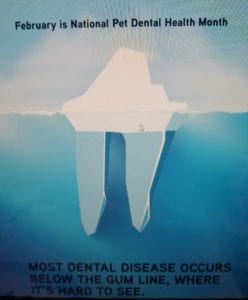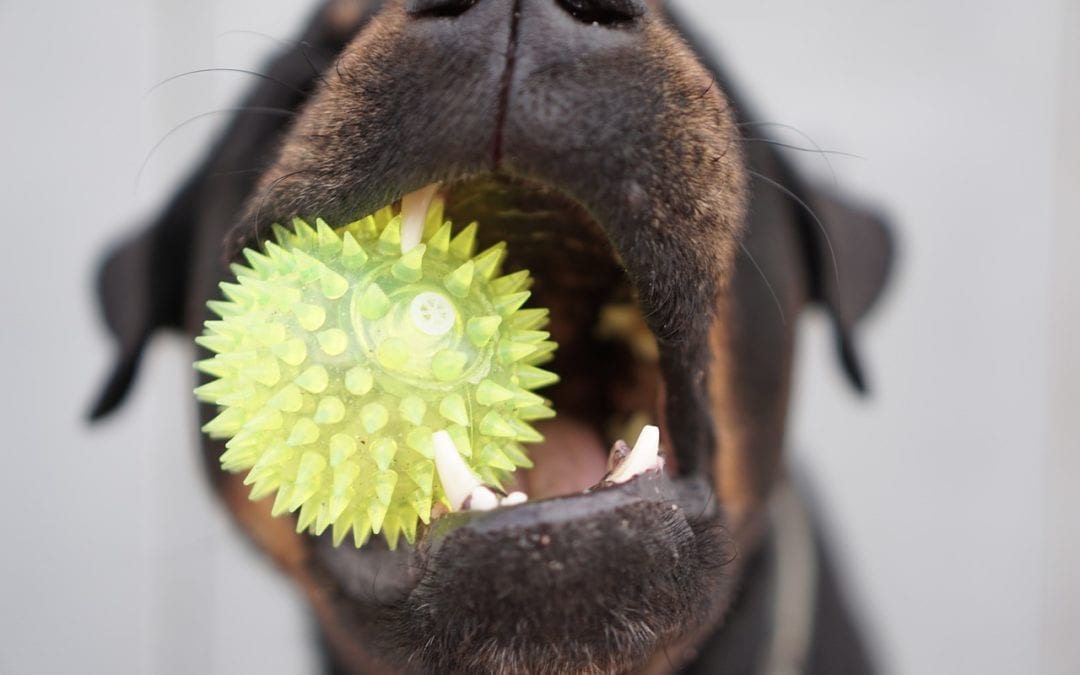 February is dental health month. During this month the American Veterinary Medical Association (AVMA) puts out extra publicity about pet dental health care. They do that because brushing your pet’s teeth and proper health care is good for both your pet’s health and your budget. AVMA does this in February because that is traditionally a slow month. We, and many doctors, do that all year long.
February is dental health month. During this month the American Veterinary Medical Association (AVMA) puts out extra publicity about pet dental health care. They do that because brushing your pet’s teeth and proper health care is good for both your pet’s health and your budget. AVMA does this in February because that is traditionally a slow month. We, and many doctors, do that all year long.
There are many ways to help your pet’s teeth. Brushing, chewing, water additives, and special diets all help keep teeth clean and healthy. Brushing your pet’s teeth is the single most effective way to maintain dental health between professional dental cleanings. Admittedly, training your puppy is easier than your adult snippy dog. This is why dental brushing is covered on the second visit of all of our puppy plans. Cats also need tooth care but are less amenable to tooth brushing. That means dental cleaning is even more important.
Even with home care, pets need routine cleanings under anesthesia to help prevent periodontal disease. Preventing dental disease saves money in the long run. A routine cleaning also allows for a complete oral examination and dental radiographs that can detect hidden health problems. We are recommending dental cleaning under anesthesia at least once a year. Dental cleaning without anesthesia is not recommended by the AVMA because it misses the periodontal disease.
Even though you brush your teeth every day, you still need to go to your human dentist and get your teeth cleaned.
AVMA President Dr. Mike Topper says regular dental exams are an integral and primary component of a pet’s overall health care and can help prevent more serious health problems. “Oral disease is the most frequently diagnosed health problem for pets; it’s also entirely preventable,” said Dr. Topper. “Twice-a-year checkups, including an oral health checkup, are important to ensure your pet is not in pain and is not suffering from serious oral health problems. Besides causing receding gums and tooth loss, bacteria in the mouth can enter the bloodstream, potentially infecting the heart, liver, and kidneys, which can be potentially life-threatening.
Dentistry can be expensive. Some of our dental cleanings with blood work, anaesthesia, painful and/or diseased tooth removal, dental radiographs and cleaning and sealant can be over a thousand dollars. Routine dentistry is usually a quarter of that cost. More routine dentistry means there is less tooth loss, less pain and less need for expensive dentistry.
But when the teeth are inflamed and infected, they need to have the infection removed. Barley’s owners where skeptical when I said his teeth needed to be cleaned. He had two teeth with advanced periodontal disease. We extracted both teeth, treated his pain and sent him home the same day. At his two week recheck, they said Barley was acting like a puppy again. Obviously, Barley had been in pain, but had no way to let his owners know. Barley is happier now.
February is dental month, but dental care is important all year long.
Information from the AVMA Website: While regular dental checkups are essential to help maintain your pet’s dental health, there are a number of signs that dental disease has already started. If you notice any of the symptoms below, take your pet into your veterinarian immediately:
· Red swollen gums
· Bad breath (similar to the smell of a rotten egg)
· Teeth that are broken, loose, discolored or covered in tartar
· Abnormal chewing, drooling or dropping food from the mouth
· Bleeding from the mouth
· Shying away from you when you touch the mouth area
· Frequent pawing or rubbing at the face and/or mouth
· Reduced appetite or refusal to eat
· Weight loss

